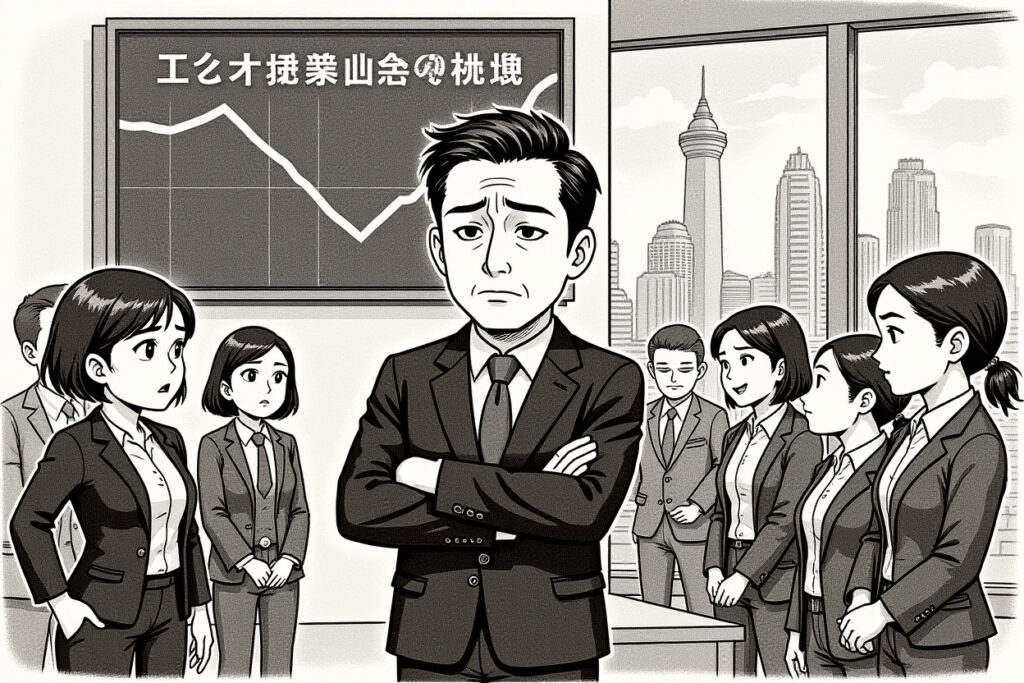The Sudden Fall of a Rising Star
Wang Teng, often referred to as the ‘Crown Prince of Xiaomi,’ saw his nine-year career at the company come to an abrupt end. The former Redmi General Manager and Head of Xiaomi China’s Marketing Department was terminated after an internal investigation found him guilty of leaking confidential company information and engaging in activities that created a conflict of interest. This move has sparked intense debate about whether Xiaomi’s response was justified or an overreaction in its ongoing confidentiality crackdown.
Who Is Wang Teng?
Wang Teng, born in 1987 and a graduate of Huazhong University of Science and Technology, began his career at OPPO in 2008 before joining Xiaomi in 2016. His rise within Xiaomi was nothing short of remarkable. Starting in 2016, he quickly climbed the corporate ladder, becoming Director of the Mobile Phone Product Department in 2019. By 2020, he had moved to the Redmi team as Product Director, where he led the development of the highly successful K40 series. In December 2024, he was promoted to Head of Xiaomi China Marketing and General Manager of the Redmi brand, putting him just one step away from vice-presidential level at the company. Known as an internet-famous executive with over 1.82 million Weibo followers, Wang Teng was widely seen as a potential successor to Lei Jun himself.
Xiaomi’s History With Leaks and Confidentiality
Xiaomi has developed a reputation for its zero-tolerance approach to information leaks, implementing what many consider to be one of the most stringent confidentiality crackdown policies in the tech industry. The company’s commitment to protecting its secrets extends beyond employees to media partners and suppliers alike.
Previous Incidents and Warnings
Wang Teng’s dismissal wasn’t his first encounter with Xiaomi’s confidentiality policies. In 2022, he received a level-two leak violation for disclosing new product launch timing, resulting in cancellation of his annual promotion and a 5,000 yuan bonus deduction. Xiaomi’s PR Head Wang Hua publicly warned Wang Teng in August 2023: ‘Return to Beijing~ work hard, otherwise next time you really will be sent to Africa, and don’t leak secrets randomly anymore, otherwise punishment will be merciless!’ Even Lei Jun himself joked about Wang Teng’s tendency to leak information during a 2024 livestream, indicating this was a known pattern of behavior.
The Media Dimension of Xiaomi’s Secrecy Policies
Xiaomi’s confidentiality crackdown doesn’t stop at employees. The company has shown equal rigor in holding media organizations accountable for leaks, sometimes with controversial results.
The SU7 Media Leak Incident
In 2023, Xiaomi organized a media event for its SU7 vehicle, requiring all participants to sign legally binding confidentiality agreements with penalty clauses. When employees from ZAKER and Xiaobai Maiche accidentally shared protected content—one mistaking approved photos for embargoed material, the other misunderstanding the scope of confidentiality—Xiaomi pursued maximum penalties. Both media companies ultimately fired the employees involved and issued public apologies. The incident highlighted the extreme measures Xiaomi employs in its confidentiality crackdown, with reported penalty amounts reaching 3 million yuan.
Supplier Relationships Under Scrutiny
Xiaomi’s suppliers have also felt the weight of the company’s confidentiality crackdown. In January 2023, automotive bloggers published images of what appeared to be Xiaomi’s first vehicle model, the MS11, along with design documents and partnership details with North China Plastic Mold. Although the leaked files were early design drafts from a secondary supplier rather than final specifications, Xiaomi took decisive action. The company imposed a 1 million yuan penalty on the supplier and demanded comprehensive reforms to their information security practices. Lei Jun personally emphasized Xiaomi’s zero-tolerance stance toward leaks, signaling to all partners the seriousness with which the company approaches its confidentiality crackdown.
Analyzing Wang Teng’s Dismissal
The specific details of Wang Teng’s violations remain unclear, but industry experts have offered insights into what might have precipitated such a severe response in Xiaomi’s ongoing confidentiality crackdown.
Beyond Simple Leaks: The Conflict of Interest Dimension
According to Xiaomi’s internal announcement, Wang Teng was terminated not just for leaking confidential information but also for ‘serious violations involving conflict of interest.’ Internet analyst Ding Daoshi noted that the wording of Xiaomi’s announcement was particularly severe, suggesting that the conflict of interest component might have been the determining factor in the dismissal. Unlike previous incidents treated as internal jokes, this violation appears to have crossed a red line in Xiaomi’s confidentiality crackdown protocol.
Industry Perspectives on Intentional vs. Accidental Leaks
Wang Guanxiong, a renowned observer and crisis PR expert, provided context: ‘In modern internet marketing, especially in the digital, mobile phone, and automotive sectors, so-called leaks—such as ‘spy photos exposure’ or ‘product new highlights流出—are actually 70%-80% corporate active marketing activities. This is an open secret in the industry. Only 20%-30% can be considered真正的所谓商业泄密.’ This perspective suggests that companies often strategically leak information for marketing purposes while maintaining strict control over truly sensitive material. Wang Teng’s case likely fell into the latter category, triggering Xiaomi’s confidentiality crackdown response.
The Aftermath and Industry Implications
Wang Teng’s dismissal has reverberated beyond Xiaomi, raising questions about corporate-media relationships, employee treatment, and the evolving nature of confidentiality in the tech industry.
The Curious Case of Amicable Separation
Unlike typical corporate dismissals, Wang Teng’s response struck many as unusual. After being terminated for serious violations, he posted on social media: ‘Very ashamed to say sorry to everyone, made some mistakes in the past, accept the deserved cost.’ He subsequently denied rumors about ‘stealing company secrets for sale, accepting money,’ clarifying that while he had committed professional errors, he had not engaged in illegal behavior. He even took the opportunity to promote upcoming Xiaomi products—an act that suggests either extraordinary professionalism or a pre-arranged narrative. Crisis PR expert Wang Guanxiong noted: ‘This ‘breakup还要秀恩爱’ method is rarely seen in business circles. Both sides gave each other dignity, more like a事先商量好的默契双打.’
Broader Questions About Corporate Secrecy
The incident has revived older questions about how companies manage sensitive information and relationships with media. Some commentators recalled a 2019 incident when a Xu姓员工 was terminated by Kuaishou for leaking Spring Festival gala plans and e-commerce strategies to media including 36Kr. Li Yang, 36Kr’s Chief Content Officer, had posed five questions that remain relevant today: ‘What should the relationship between companies and media be? What constitutes a healthy and orderly way of coexistence? Is venting anger on one’s own employees体现无能和残忍? After such actions, does the relationship between companies and media improve or worsen? Is media that loses independent thinking ability and can only serve as a company’s发声管道still media?’ These questions underscore the complex dynamics at play in Xiaomi’s confidentiality crackdown and similar corporate actions industry-wide.
Lessons From Xiaomi’s Confidentiality Approach
Xiaomi’s handling of the Wang Teng situation offers several important lessons for companies navigating the challenges of information security in the digital age. The incident demonstrates that even high-performing executives are not immune to the consequences of violating confidentiality policies when the company is committed to a rigorous confidentiality crackdown. It also highlights how social media has complicated corporate secrecy, as executives with large followings must navigate the line between building brand engagement and protecting sensitive information. Finally, the case shows that conflicts of interest—not just straightforward leaks—can trigger severe responses in today’s corporate environment.
Final Thoughts on Corporate Secrecy and Accountability
The dismissal of Wang Teng represents more than just another corporate personnel change—it reflects the intense pressure tech companies face in protecting intellectual property and maintaining competitive advantage. Xiaomi’s confidentiality crackdown, while seemingly severe to outside observers, aligns with practices across an industry where information leaks can cost millions and undermine product launches. What makes this case particularly noteworthy is how it blends serious policy enforcement with elements of performance—from Lei Jun’s previous public joking about Wang Teng’s leaks to the strangely amicable separation after termination. As companies continue to grapple with information security in an era of social media and rapid news cycles, the balance between reasonable protection and overzealous enforcement will remain a challenging frontier. The ultimate lesson may be that in today’s business environment, no employee—no matter how senior or successful—is above the protocols designed to protect corporate secrets.




